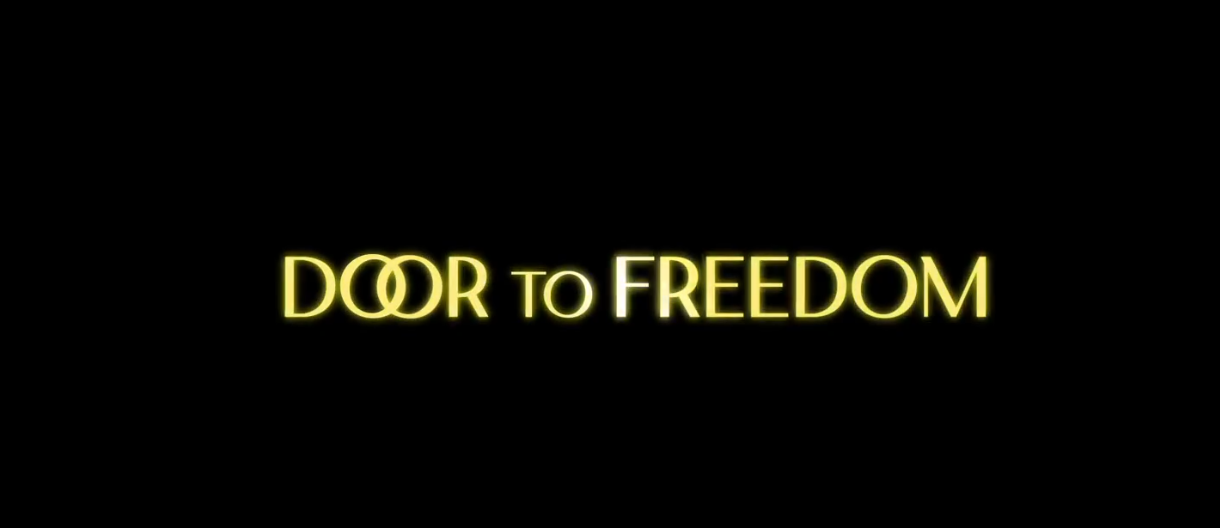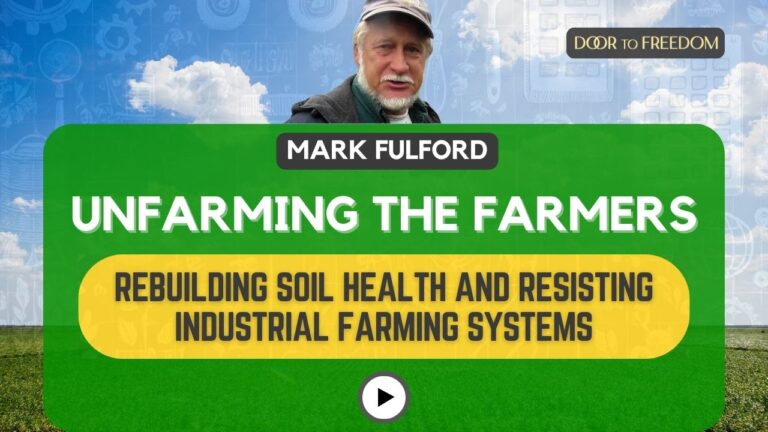Dear Friends,
As you know, Door to Freedom and Children's Health Defense put on a 2-day, 17-hour symposium last Friday and Saturday, titled, "The Attack on Food and Farmers, and How to Fight Back." Everyone said the speakers and content were excellent.
There were 40 talks in all, and then a wrap-up with former Assistant Secretary of HUD Catherine Austin Fitts, attorney and farmer John Klar and myself.
Some of the talks were heart-warming, such as how children are being taught about farming. Some informed us how to improve our health. Some provided very hard-to-find information regarding the geoengineering of our weather, or the many important nutrients that are lost when milk is pasteurized.
The two days were very intense. There was a lot of troubling news to take in about the ways traditional farming is being attacked in order to be replaced by industrial food and centralized control over food. It's news we need to know about, but it's very hard to take in so much in one long blast.
For example, there was the 30 by 30 plan that Margaret Byfield discussed: an effort to conserve 30% of the US' land and water by 2030. This is actually a global initiative, and farmland is being set aside for "Natura" areas in Europe as part of the same program. It doesn't seem possible that the globalists could have such bold designs — but they do, and it is already happening.
By the time we got to the "Solutions" part of the symposium, most viewers were struggling to take it all in. Even I was struggling–and I had chosen the subjects and speakers.
Luckily, we have a solution so viewers can get all this great information, but not be overwhelmed. We are separating out all the individual talks, and making clips from each one, so that you can watch just one or all forty talks at your leisure and get an idea from the clips which ones you'd like to see. We should have the individual talks ready by next week, and the clips ready soon after.
It is a lot to take in, but the future of food and farming will be bleak if we close our eyes to what is happening. There is plenty of scope to fight back, and we provide "Take Action" information on 8 key areas so viewers can start responding immediately.
Here is CHD's The Defender article on the symposium:
I'll talk with you next week,
Sincerely,
Meryl Nass, MD
‘Don’t Eat the Bugs’: How to Reclaim Control Over the Food System
“Attack on Food and Farmers and How to Fight Back,” a two-day symposium featuring 40-plus speakers, brought together doctors, journalists, researchers, farmers and politicians to discuss what’s happened to the global food system — and how to fix it.
September 10, 2024
A global elite seeking to centralize control over food is transforming agriculture, creating a food system and an ecosystem that is less healthy and more dangerous, according to experts who participated in a two-day symposium on Sept. 6 and 7.
The “Attack on Food and Farmers and How to Fight Back” brought together doctors, journalists, researchers, farmers and politicians from across the world to discuss what’s happening to the global food system and to outline the strategies that farmers, policymakers and consumers are using to return control of the food system to the people.
Over 40 speakers presented at the symposium, hosted by Children’s Health Defense and Door to Freedom.
After opening comments by Dr. Meryl Nass, who organized the symposium, Catherine Austin Fitts of the Solari Report and author Patrick Wood kicked it off, outlining how long-term efforts by technocratic elites to control the food system are linked to a strategy to concentrate control over the financial system — and how farmers are resisting.
Speakers discussed how glyphosate and other pesticides, genetically modified organisms (GMOs), vaccines, new forms of genetic engineering and land concentration — along with state laws that make it difficult for farmers to get their food to markets, national policies like the farm bill and international policies like One Health — together constitute a global attack on food and agriculture.
“It is very important to understand we’re fighting, not just for our freedom,” Fitts said, “but we are fighting to make sure that we are not the victims of famine either because we will not be able to get food or because we will be able to get food that is not worth eating.”
Speakers also addressed how to “fight back,” pointing to farmer revolts across Europe, regenerative farming strategies cultivated by farmers across the world and ways consumers make change every day if they “buy food, in cash, direct from local farmers.”
Symposium highlights: the problems
André Leu, international director of Regeneration International, kicked off the sessions addressing how the food supply is being poisoned, and its implications for human health.
He detailed the devastation wrought on environment, food and health by decades of an industrial agricultural system that continues to drive millions of small farmers out of agriculture each year, and how agroecological regenerative organic farmers are connecting through Regeneration International.
Moms Across America’s Zen Honeycutt, attorney Michael Baum, and researchers Don Huber, Ph.D., Stephanie Seneff, Ph.D., and author Jeffrey Smith gave presentations on the impacts of glyphosate, GMOs and gene editing. They discussed how awareness campaigns, lawsuits and policy advocacy have been effective in the fight to get them out of the food system.
Honeycutt, whose organization had been testing products for glyphosate since 2013, said the dangerous chemical has become ubiquitous, “Almost everything tested has been presenting with concerning levels of glyphosate” from food to sperm to vaccines.
“This widespread contamination of glyphosate is happening practically in every meal if you’re not eating organic. … this is a national crisis,” she added the chemical has only been in popular use since the mid-90s in the U.S.
Speakers including regenerative farmer Breeauna Sagdal, attorneys John Klar and Pete Kennedy and Alliance for Natural Health International founder Robert Verkerk, Ph.D., addressed the war on livestock, meat and raw milk. And CHD’s Brian Hooker, Ph.D., discussed bird flu, including how mass testing has been deployed to cull flocks of chickens and cattle.
In a lawsuit over raw milk — challenging restrictions on unpasteurized dairy, the only food banned in interstate commerce — Kennedy said the U.S. Food and Drug Administration (FDA) “put its views on food freedom on the public record.”
“FDA declared that there were no fundamental rights to consume the foods of your choice, to feed your children the foods of your choice. And that you have no fundamental right to bodily autonomy.”
Presentations addressed how food itself is making people sick, with loss of nutrients and dangerous additives.
John Moody explained how agricultural inputs have made food today less nutritious. Dr. Sherry Tenpenny talked about vaccines that go into the animals people eat. Elze van Hamelen gave a presentation on what she called “pharma foods,” or lab-grown meat, detailing the production process and the many known and potential dangers coming out of the biotech labs making the “meat.”
Tenpenny gave an overview of the hundreds of vaccines in the U.S. approved for cattle, chickens, swine and seafood. Recent debate around vaccines for animals has focused on the one mRNA vaccine, which is approved for pigs, Tenpenny said, “We need to know more about what has been injected into our food for a long time.”
Several speakers addressed the changing economic dynamics and new rules that are obstructing and eliminating farmland. Brook DeLorme explained how transmission lines and solar panels are breaking up farmland.
Tracy Thurman discussed how communities like the Amish — that have succeeded at living healthy lives without relying on Big Tech, Big Education or Big Pharma — have flourished, but are now in the crosshairs of elites seeking to destroy alternative ways of life.
Margaret Byfield, executive director at American Stewards of Liberty, gave an overview of the U.S. 30 by 30 program, a federal initiative established by a Biden administration Executive Order pledging to protect 30% of land and water by 2030 by bringing it under federal control. That “protection,” she said, intends for land to have very restricted use. It would stop farmers from using land and would require the acquisition of 300 million acres by the federal government.
“This is not about conservation,” Byfield said, “this is about control.” She said the program is linked to a plan by companies like the Intrinsic Exchange Group to monetize and trade on land, but also on natural processes like photosynthesis and pollination — an agenda pushed by organizations like the Rockefeller Foundation, the World Wildlife Fund and the White House.
Former Tenessee Sen. Frank Niceley discussed how industry eliminates the legislators who control them. Alexis Baden-Mayer, political director at the Organic Consumers Association, explained recent changes in the Farm Bill that would allow the U.S. Department of Agriculture (USDA) to set up its own Administration for Strategic Preparedness and Response (ASPR) at the U.S. Department of Health and Human Services.
“They’re [ASPR] in charge of a great big stockpile of vaccines and pharmaceuticals to prepare for pandemics. And now the USDA wants their own stock pile of medical countermeasures so that they can dole out big contracts.”
Speakers including Ginny Silcox, Peter Kirby and J. Marvin Herndon, Ph.D., discussed geoengineering and weather control and its impacts on agriculture.
The solution: ‘don’t eat the bugs’
Journalist James Corbett kicked off part two of the symposium, offering strategies that people can use daily to refuse participation in this toxic system — “Don’t eat the bugs,” he said, referring to the World Economic Forum agenda to feed people insect-based food.
He also suggested boycotting ultra-processed foods, GMOs and other items that contain toxins, and instead supporting alternatives by buying from local farmers, pooling resources and working together with others and staying informed.
Corbett said people can make these changes gradually. “I’m suggesting today, it doesn’t have to be an all at once, a 100% or nothing type of switch … No, it could be a gradual process of discovering something new in your area, swapping out something from the supermarket for something that you can source from some local farmers market.”
Robert F. Kennedy Jr. talked about how “broken agricultural subsidies and USDA incentives” have destroyed soil health. “There’s a better way and it revolves around fixing agricultural incentives and guidelines to empower our farmers to shift to regenerative agriculture.”
Several speakers, including Dr. John Day, herbalist Sara Woods Kender, Joel Salatin and Leigh Merinoff shared everyday strategies for farming, buying food, preparing food, living off-grid and educating youth through which people can increase their health and food security and so that farming can be restored, as farmer Mark Fulford put it, from an “extractive process” to a “creative practice.”
Speakers including Richard Cook, Lt. Col. Tommy Waller, Sagdal and Judith MgGeary addressed macro-level changes that could happen at the policy level to guarantee food sovereignty and food security.
For example, McGeary talked about how she and others worked to successfully block electronic tagging of livestock that would have mandated the tagging of every farm animal, driving up costs for small farmers and allowing for surveillance of every animal-related farm transaction — concentrating profits for Big Agriculture companies.
Now, she said, the USDA has initiated a project to mandate electronic tags for cattle and bison crossing state lines and if it isn’t stopped, it will continue to expand to surveil all animals from birth to death. “This program and the way it promotes big agribusiness is bad for everybody except the corporate profits,” she said.
Speakers Mark McAfee, Dr. Michelle Perro and Meleni Aldridge closed out the speaker sessions discussing how to heal with wholesome food.
Final takeaways: Food liberty is necessary for all liberty
Summarizing key takeaways, Fitts quoted Klar, saying that “Food liberty is necessary for all liberty,” because food is linked to many key freedoms. She also said consumers can protect their own health and move markets. “We have got to take action,” she said.
“We have learned that we have choices over our food,” Klar added, pointing to the many different proposals to grow food, grow bonds between farmers and consumers, and grow advocacy.
“We’re strong together,” he said and shared advice that Wendell Berry gave him when he was fighting to protect Vermont farmers’ rights to slaughter their own animals: “Find your allies.”
Nass added that the conference had shown that “the government is not really providing us with solutions but creating problems for us and yet individuals are very good at finding solutions.”
She called for everyone to visit the Take Food Action page at Door to Freedom to advance the ideas shared during the symposium.
“Never underestimate what is possible,” Fitts said, “especially if a lot more people pile in, whether you pile in as a consumer or you pile in as a citizen.”
Watch Day 1 and Day 2 on Door To Freedom's Video Channel








